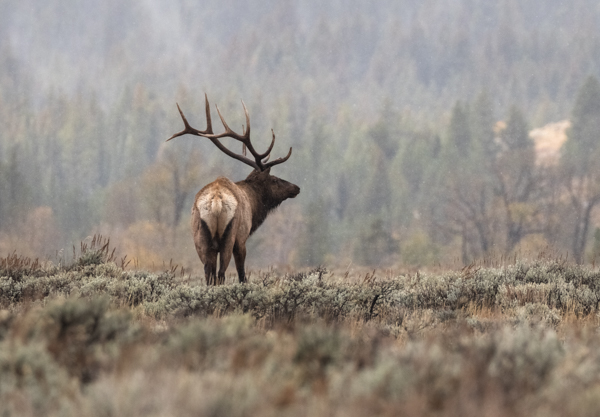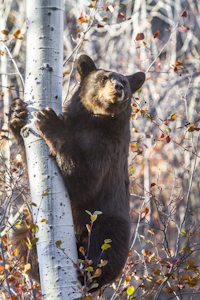
|
|
|||||
|
Grand Teton Landscape and Wildlife Photography Workshop
Note: we always conduct our Yellowstone National Park workshop just before this workshop, Authorized permittee of the National Park Service
|
Photos from the last workshop
|
Imagine waking before sunrise... you're walking with your group along the Snake River in Wyoming... all around you are sounds that seem almost prehistoric. It's cold outside, but your blood begins to tingle... You're only one day into your workshop and already you're in the thick of it... the elk rut. Join us on an unforgettable photographic adventure into Grand Tetons National Park. Grand Tetons has arguably the highest concentration of wildlife of any park in the United States, including Yellowstone, and Alaska. While we can't guarantee you will see wildlife, we can certainly make sure we make every effort possible to use our in the field experiences to make sure we put you in the best possible places at the best times. We will also make sure you've had proper instruction so that if that huge bull elk wanders out of the fog and crosses the river 25 yards in front of you... you're set to get images of it. In addition to the elk, Grand Tetons has bison, bears, wolves, moose, and a large assortment of smaller game and birds that all call this park home. Most people would be content with just the wildlife options the park has to offer.
If that's not enough...we'll also show you how to take your camera off of automatic, and shoot completely in manual mode. Our goal is to get you well on your way to taking the power back from the camera and placing the knowledge in your hands, so when you see that beautiful sunset...you know what to do to make sure you capture it correctly...and don't go home wondering what your camera did to mess up another magic moment. We put a lot of time into planning our workshops...from in the field research months ahead of time...to setting up itineraries days prior that take into account all the latest weather conditions and increase our chances of coming away with the best possible shooting situations. Our first goal is always to have students learn...but we feel so much better if they take home some killer images as well.
Wildlife... landscape... learning how to photograph both of them better; meeting new friends, and maybe seeing old friends from a past workshop... what could be better? How about doing all of this, surrounded by the beauty of Grand Teton National Park? What is Required
Lodging, Meals & Directions
Lodging and meals are not included. Suggested lodging will be emailed upon sign-up. We will take a break mid-day, each day, for lunch and rest. There are many restaurants in the area as well as for dinner.
What's Included/Not Included
What's Included in Your Workshop:
What's not included
Safety, Confidence, Being Prepared
Aperture Academy is a professional organization dedicated to safe, quality, positive experiences for our students, and responsible stewardship for the breathtaking locations and beautiful wildlife we enjoy at every workshop. We work with the United States Department of Interior, the National Park Service, and the US Forestry Service to obtain all the proper permits to operate safely, conscientiously, and legally. We carry much more than the required minimum of insurance, and our skilled instructors are certified as Wilderness First Responders, in CPR, as well as in the Leave No Trace Outdoor Ethics program. And, have we mentioned that each is an accomplished, successful professional photographer? Every "ApCad" member is dedicated to ensuring our students receive the best care and guidance possible, so each of them has the opportunity to get the most remarkable, enjoyable, and enriching photography experience available anywhere in the world. What to Bring
Workshop FAQs
:: What should I expect? :: All workshops are designed to help you learn how to take better photographs and offer a complete immersion into digital landscape and/or wildlife photography. You will learn important photography techniques such as how to properly expose a composition, when to use a filter for best effect, and how to understand and adjust camera settings for optimum results. :: Why only Digital? :: Digital photography offers unique opportunities for in-field photography workshops. By reviewing captured images as soon as they happen, we can examine exposure, composition and histograms, and instantly learn what works--and what doesn't. :: What should I bring? What is required? ::
:: What kind, and how much, equipment should I bring? :: Bring it all if you can! You never know what you might see. On many workshops we focus on landscape photos, but you never know when wildlife might enter the scene and provide the perfect opportunity to photograph them in their natural habitat. It's always better to go into the field with too much gear, rather than miss an opportunity because of not enough equipment. :: Is transportation provided? :: Each student is responsible for their own transportation during the workshop. :: Can a non-photographer friend or spouse attend the workshop? :: Non-photographer friends and or spouses are welcome to attend but will be liable for their transportation. For more information, please contact the Aperture Academy staff. :: Does weather ever alter or cancel events? :: Only if conditions pose a safety risk. Often, poor weather can make for dramatic photographic opportunities, so if rain is forecasted, pack a light jacket or rain poncho and bring something to keep your camera dry (a hotel shower cap is ideal). :: What happens if I have to cancel? :: Because of the limited number of workshops and availability of one-on-one instruction sessions, once we schedule a spot, it won't be available for anyone else, therefore we can not offer a refund unless the cancellation is 90 days before the workshop date. This policy is necessary to assure us that those who sign up are serious about the adventure and will not back out, ruining the opportunity for someone else. :: Be prepared to take better photographs! :: These workshops will help you develop skills, learn techniques and get to know your camera and equipment like never before. As a bonus, you will have a fun time and build friendships while learning to improve your photography technically. The result? You'll be capable of producing photographs as beautiful as any professional! |
|
 |
Other Cool Stuff→ Past Workshop Photos → 72dpi.com → How-To Articles → Photographer of the Month |
 |
Contact Us→ Contact Us → About Us → Site Map |
© 2009-2024 Aperture Academy, Inc.

 But, the Tetons are also a hot spot for landscape photography. Whether you're taking in a sunrise from the still waters of Schwabacher's Landing, or Watching the last rays of sun filter over the valley and across the famous barns of "Mormon Row' your instructors will make sure you're in a prime spot at the prime times to capture the best possible images of the truly amazing landscapes the Tetons provide. While many workshops will provide a majority of their instruction in a classroom-type environment, we prefer to take a hands-on approach and have you learn by doing...we will be there to guide you in the field as you work on composition, exposure lengths, and Depth of Field. We will also show you how to use a variety of filters to help balance out a scene, which, ultimately results in less time spent in the computer post-processing.
But, the Tetons are also a hot spot for landscape photography. Whether you're taking in a sunrise from the still waters of Schwabacher's Landing, or Watching the last rays of sun filter over the valley and across the famous barns of "Mormon Row' your instructors will make sure you're in a prime spot at the prime times to capture the best possible images of the truly amazing landscapes the Tetons provide. While many workshops will provide a majority of their instruction in a classroom-type environment, we prefer to take a hands-on approach and have you learn by doing...we will be there to guide you in the field as you work on composition, exposure lengths, and Depth of Field. We will also show you how to use a variety of filters to help balance out a scene, which, ultimately results in less time spent in the computer post-processing. While we spend a lot of time planning the photographic portion of our workshop...we will spend just as much time planning the camaraderie portion of our workshop. We want participants to have fun...meet new friends, and come away with memories other than just those created with the camera. It's not uncommon for our workshops to have lunches and dinners together where everyone can share stories from the day, or listen to their instructors tell some crazy tales from their time in the field. Did you know they once took a crockpot 11 hours in a car to Death Valley...cooking their dinner the WHOLE way? It's times like this where bonds are created, and many times after the workshops students will coordinate with others from their workshop to see which one they want to attend next. Check out the testimonials from previous workshops...see what they have to say.
While we spend a lot of time planning the photographic portion of our workshop...we will spend just as much time planning the camaraderie portion of our workshop. We want participants to have fun...meet new friends, and come away with memories other than just those created with the camera. It's not uncommon for our workshops to have lunches and dinners together where everyone can share stories from the day, or listen to their instructors tell some crazy tales from their time in the field. Did you know they once took a crockpot 11 hours in a car to Death Valley...cooking their dinner the WHOLE way? It's times like this where bonds are created, and many times after the workshops students will coordinate with others from their workshop to see which one they want to attend next. Check out the testimonials from previous workshops...see what they have to say.





